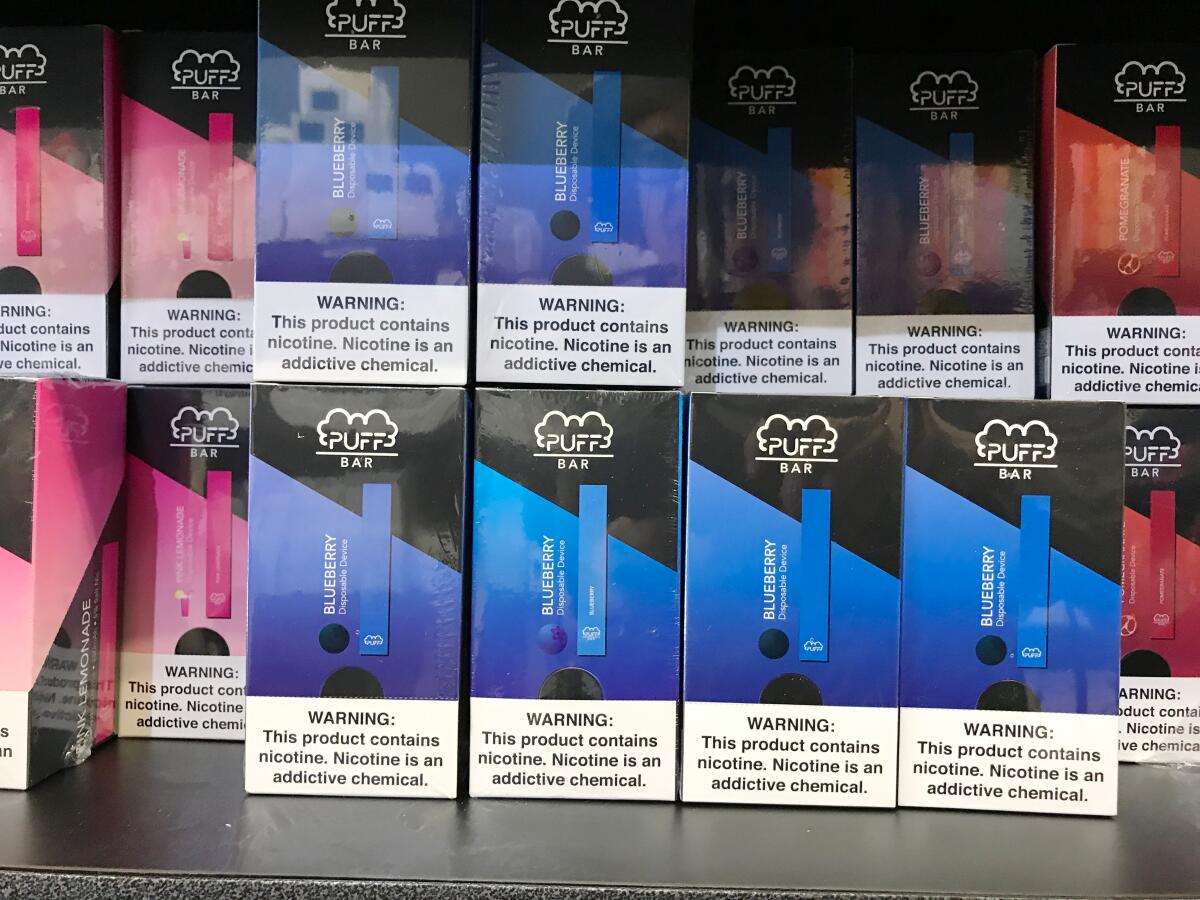L.A. Unified files lawsuit against vaping company Juul

- Share via
Los Angeles school officials on Tuesday joined a growing number of public agencies taking legal action against youth vaping, filing a class-action lawsuit on behalf of school districts throughout the state against San Francisco-based industry leader Juul.
The litigation seeks unspecified compensation to the school district for financial harms and punitive damages. It also petitions the court to allow L.A. Unified’s suit to be a vehicle for school systems across the state to receive compensation from Juul. In the complaint and in a downtown news conference, officials and attorneys laid out the alleged damage suffered by schools systems and the students they serve.
“We are taking this step to hold Juul accountable for the role it has played in creating an epidemic that affects the health of our students, disrupts student learning and is taking money away from our core mission — educating students,” L.A. schools Supt. Austin Beutner said in a statement. The use of Juul electronic-cigarette devices “has led to violence on our campuses. We have had to divert dollars away from classroom instruction and instead spend it on counseling and programs to help inform students of the dangers of vaping.”
Attempts to contact a Juul representative on Tuesday were not successful, but Juul has characterized its response to increasing scrutiny and health concerns as appropriate and responsible. The company has said it will suspend the sale of mango, creme, fruit and cucumber pods in the U.S., while also suspending U.S. advertising.
Flavored pods are especially appealing to young, first-time nicotine users, experts have said. And critics contend that advertising has been aimed at teenagers, using techniques honed by the tobacco industry over decades to hook young people onto cigarettes.
“Big Tobacco is now prohibited from employing these tactics and strategies to market traditional cigarettes,” the lawsuit states. “Nothing prevented Juul from doing so.”
Juul also hired social media “influencers,” to attract youths to its product, the suit stated. “Juul now insists it never marketed to young people. This assertion is patently false.”
In its court filing, L.A. Unified said it tallied 435 vaping incidents last year. The number is trending higher this year and is actually an extreme undercount, according to the suit, which noted that L.A. school police estimate they responded “to over 1,000 vaping incidents.” In fact, most vaping may go completely undetected, officials said.
Vaping has made it difficult for students to use bathrooms as bathrooms, the lawsuit states, and has exacerbated attendance problems for many students, directly hindering their learning. Moreover, resources that are increasingly used to combat vaping are not available for helping improve student achievement.
On Aug. 19, the Los Angeles County of Department of Public Health released survey results indicating that more than 30% of high school students said they used e-cigarette products; 10% said they were regular users.
The Centers for Disease Control and Prevention has linked vaping to 1,479 cases of a mysterious lung disease over the last six months. At least 33 people have died since the outbreak began.
The illness is marked by chest pain, shortness of breath and vomiting, and it has largely affected young people. The vast majority of cases, almost 80%, involve e-cigarette users younger than 35, and an additional 15% are younger than 18.
And although e-cigarette manufacturers have advertised their products as a better option for adult smokers already hooked on nicotine, experts say vaping plays the opposite role for young people who have never smoked: It establishes a nicotine addiction that will ultimately lead to cigarette smoking and other harms.
In recent weeks, school systems in St. Charles, Mo.; Olathe, Kan.; and on Long Island in New York filed suit against Juul. And cities and states are increasingly imposing restrictions on e-cigarette products.
More to Read
Sign up for Essential California
The most important California stories and recommendations in your inbox every morning.
You may occasionally receive promotional content from the Los Angeles Times.











